Physical Address
304 North Cardinal St.
Dorchester Center, MA 02124
Physical Address
304 North Cardinal St.
Dorchester Center, MA 02124

Master the art of stress-free camping with our foolproof checklist system that prevents costly forgotten essentials and midnight disasters.
You’ve probably experienced that sinking feeling when you’re miles from civilization and realize you’ve forgotten something vital. Maybe it was your water filter, or perhaps the tent stakes that seemed so obvious you didn’t write them down. Smart campers know that a solid checklist isn’t just helpful—it’s the difference between a memorable adventure and an expensive mistake. Here’s how to build a foolproof system that’ll save you money, time, and those middle-of-the-night panic moments.
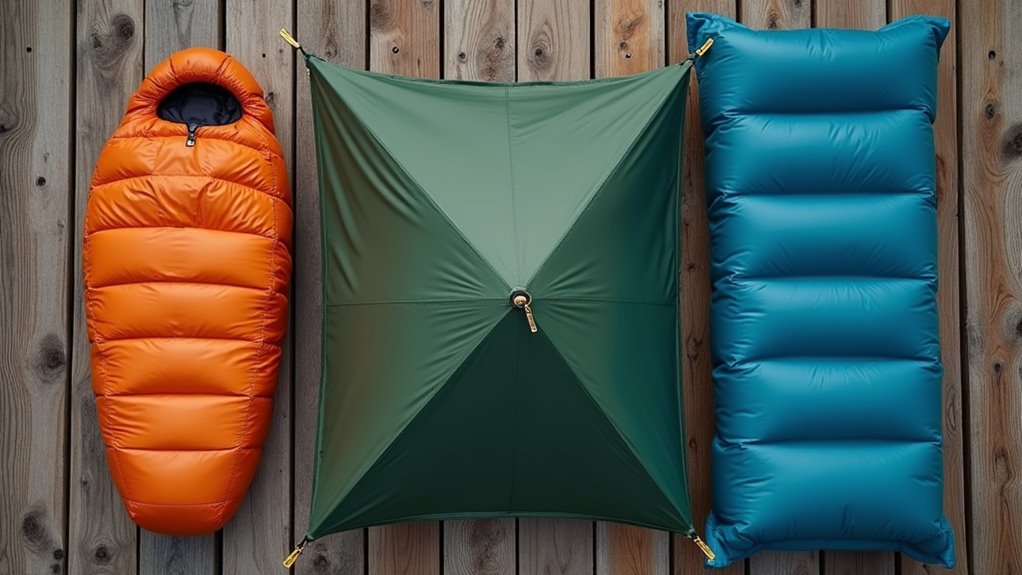
How well you sleep outdoors directly impacts your entire camping experience, making shelter and sleep gear your most critical investment. Your tent should match your camping conditions—three-season tents work for most situations, while four-season models handle extreme weather. Don’t skimp on tent footprint; it’ll extend your tent’s life considerably.
Your sleeping bag’s temperature rating should exceed expected nighttime lows by 10-15 degrees. Synthetic fill costs less and handles moisture better, while down provides superior warmth-to-weight ratio. Pair your bag with a quality sleeping pad—it’s not luxury, it’s insulation from ground cold.
Consider these budget-friendly additions: inflatable pillow, tent repair kit, and extra guylines. These small investments prevent miserable nights that’ll ruin your entire trip. If you’re planning to explore trails during your camping adventure, mountain biking offers an excellent way to cover more ground and discover remote camping spots that aren’t accessible by car.
After securing your sleep setup, your camp kitchen deserves equal attention since hungry campers quickly become grumpy campers. You’ll need a reliable camp stove with extra fuel canisters – single-burner models work fine for basic meals. Pack lightweight cookware like a nesting pot set and a sturdy spatula. Don’t forget essentials: can opener, sharp knife, cutting board, and plates that won’t shatter.
For food storage, bring a quality cooler with plenty of ice packs. Store perishables properly and keep raw meat separate. Pack non-perishable backup meals like instant oatmeal and canned soup. A bear-proof container or rope for hanging food bags is essential in wildlife areas.
Water bottles, a portable water filter, and biodegradable soap complete your kitchen setup affordably. Don’t overlook personal hygiene needs – pack camping showers to stay clean and comfortable during your outdoor adventure.
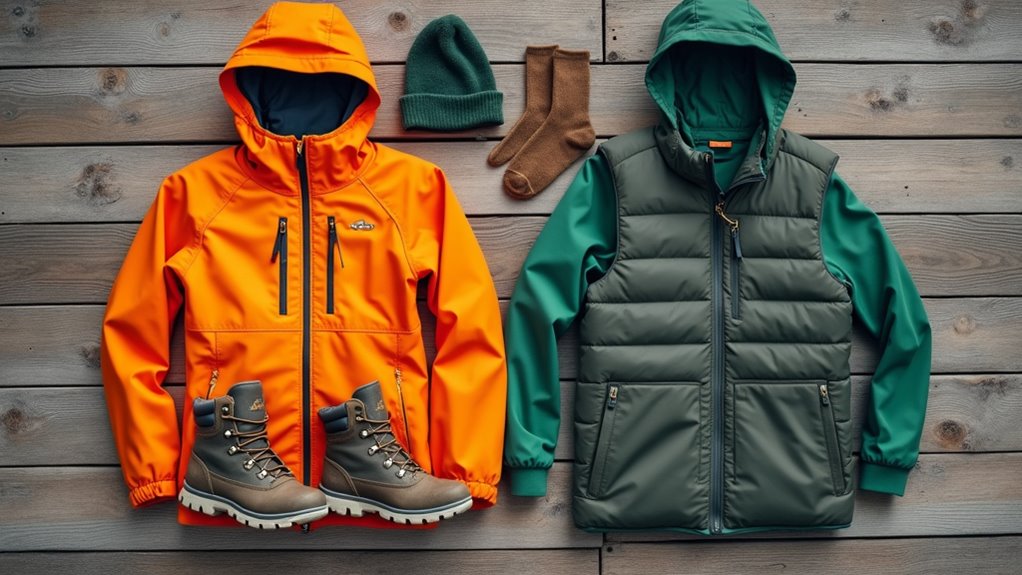
While weather can change rapidly in the outdoors, smart clothing choices will keep you comfortable without breaking your budget. You’ll need moisture-wicking base layers, insulating mid-layers, and a waterproof outer shell.
Pack extra socks and underwear—wet feet lead to miserable camping trips.
Don’t forget a warm hat and gloves, even in summer. Nights get surprisingly cold.
Choose quick-dry pants over cotton jeans, and bring both shorts and long pants regardless of the forecast.
For personal items, pack biodegradable soap, toothbrush, toothpaste, and toilet paper.
Include sunscreen, insect repellent, and any prescription medications.
A small mirror and wet wipes are incredibly useful.
Remember a headlamp or flashlight with extra batteries. You’ll thank yourself when nature calls at midnight.
If you’re planning to explore Britain’s camping scene, consider visiting Britain’s Motorhome Show to discover the latest gear and accessories that could enhance your outdoor adventures.
Beyond keeping yourself comfortable and clean, you need to know where you’re going and how to stay safe once you get there. Pack a reliable map and compass—don’t rely solely on your phone since batteries die and signals disappear. A GPS device or smartphone with offline maps works as backup navigation.
Pack a reliable map and compass—don’t rely solely on your phone since batteries die and signals disappear.
For safety, bring a well-stocked first aid kit with bandages, antiseptic, pain relievers, and any personal medications. Pack a whistle for emergency signaling and a flashlight with extra batteries. Consider a multi-tool or knife for various tasks.
A small emergency shelter like a space blanket costs under five dollars but could save your life.
Don’t forget to pack extra water and know how to prevent dehydration since it’s one of the most serious risks you’ll face in the wilderness.
Finally, tell someone your planned route and expected return time before heading out.
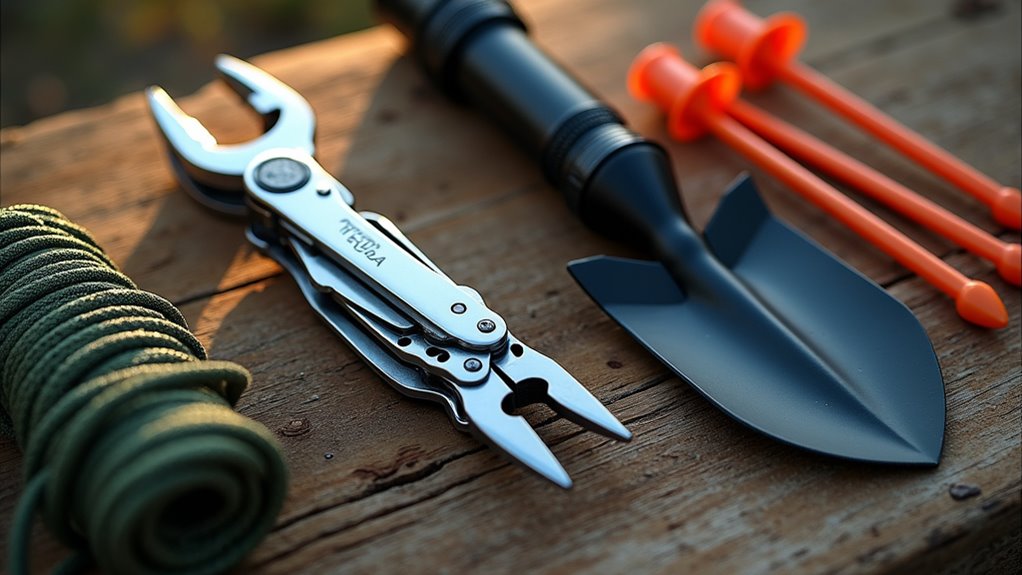
Once you’ve reached your campsite, having the right tools makes setup quick and stress-free. You’ll want a sturdy camping hammer or mallet for driving tent stakes into hard ground. Pack a multi-tool or Swiss Army knife – they’re invaluable for countless tasks around camp. Don’t forget duct tape for emergency repairs; it fixes everything from torn tents to broken gear.
Bring 50 feet of paracord or rope for securing tarps, hanging food, or creating clotheslines. A small folding shovel helps with fire safety and waste disposal. Include bungee cords and carabiners for quick attachments and organization.
Add work gloves to protect your hands during setup, and pack a headlamp plus extra batteries for hands-free lighting. These essential tools ensure you’re prepared for any campsite challenge. If you’re planning to tackle multi-day adventures like Scotland’s West Highland Way, having reliable gear becomes even more crucial for your success and safety.
When darkness falls at your campsite, reliable lighting becomes essential for safety and comfort. You’ll need multiple light sources since relying on one isn’t smart.
Pack a dependable headlamp for hands-free tasks like cooking or setting up camp. Don’t forget extra batteries or choose rechargeable options to save money long-term.
A quality headlamp with backup batteries is your most versatile camping light investment for essential nighttime tasks.
Bring a bright lantern for your main gathering area and smaller flashlights as backups. Solar-powered lights work great for extended trips and won’t drain your power sources.
Speaking of power, a portable battery bank keeps your phone and devices charged for emergencies.
Consider glow sticks for kids – they’re cheap, safe, and fun. String lights create ambiance without breaking the bank.
Always pack backup lighting because you can’t predict when your primary source might fail.
Research the best camping lanterns available to ensure you choose models that provide optimal brightness and durability for your specific outdoor adventures.
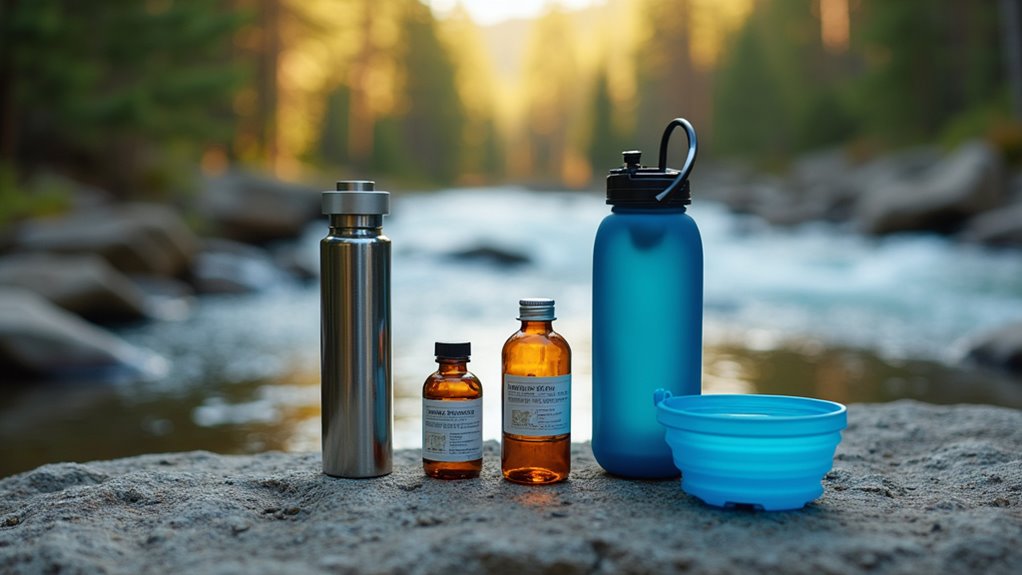
Just as important as keeping your campsite well-lit is making sure you’ve got safe drinking water throughout your trip. You’ll need reliable purification methods and enough hydration supplies to keep everyone healthy and comfortable.
Pack water purification tablets or drops as your backup option—they’re cheap, lightweight, and effective against most contaminants. A portable water filter is worth the investment for longer trips.
Bring at least one gallon per person per day, plus extra for cooking and cleaning.
Don’t forget collapsible water containers to save space when they’re empty. A few reusable water bottles with measurement markings help you track daily intake.
Consider electrolyte packets for hot weather camping—they’ll help replace what you lose through sweat without breaking your budget.
A dedicated camping water filter provides essential protection against waterborne pathogens that could quickly turn your outdoor adventure into a health emergency.
Building a reliable fire can make or break your camping experience, so you’ll want multiple fire-starting methods in your gear arsenal. Pack waterproof matches, a quality lighter, and fire starter cubes or dry tinder as your primary tools. Don’t forget backup options like flint and steel or magnesium fire starters – they’ll work even when wet.
You’ll need tools to maintain your fire too. Bring a small folding saw or hatchet for cutting wood, plus work gloves to protect your hands. Pack newspaper or birch bark as kindling, and consider bringing some dry wood if you’re unsure about local availability.
Store everything in a waterproof container or dry bag. Wet fire supplies won’t help when you need warmth most. If you’re camping near water where fishing is allowed, consider whether renting or buying fishing equipment makes more sense for your trip duration and frequency.
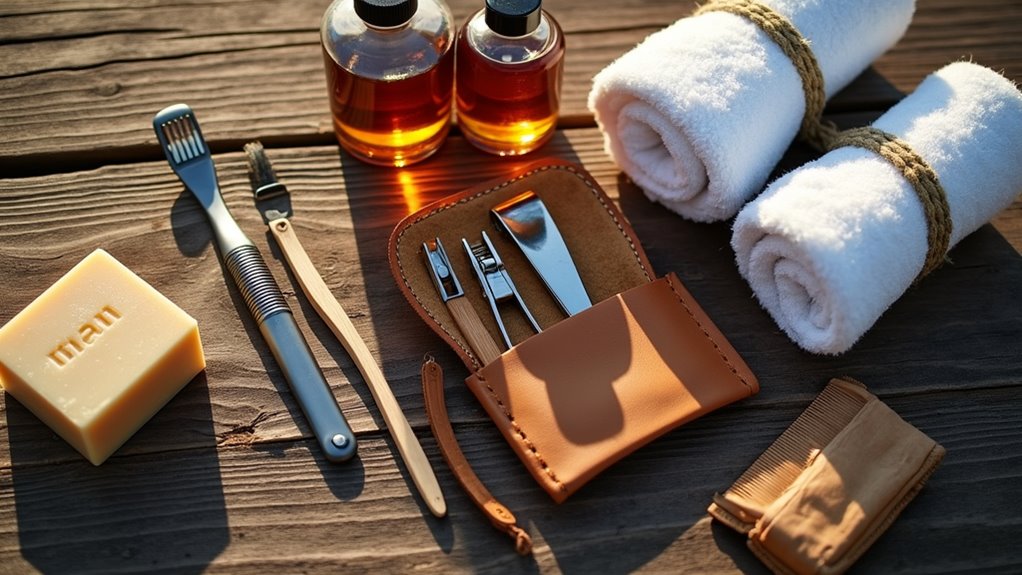
After getting your fire setup sorted, you’ll want to pack the hygiene basics that’ll keep you comfortable and healthy during your trip. Start with biodegradable soap that works for both body and dishes – it’s multipurpose and eco-friendly. Pack a quick-dry towel, toothbrush, toothpaste, and toilet paper in waterproof bags.
Don’t forget hand sanitizer, wet wipes for quick cleanups, and feminine hygiene products if needed. A small mirror helps with basic grooming tasks. Bring deodorant, sunscreen, and insect repellent to stay protected outdoors.
Consider a portable camp shower or solar shower bag for longer trips. Pack everything in a dedicated toiletry bag with compartments – you’ll appreciate the organization when you’re searching for items in dim lighting.
If you’re planning to combine camping with adventure activities like rock climbing, extra care with hand hygiene becomes even more important for maintaining grip and preventing infections from cuts or scrapes.
When you’re miles from civilization, a well-stocked first aid kit becomes your lifeline for handling injuries and medical emergencies. Don’t skimp on basics like adhesive bandages, gauze pads, medical tape, and antiseptic wipes.
Pack pain relievers, antihistamines, and any personal medications you’ll need.
Include tweezers for splinter removal, scissors for cutting tape or clothing, and instant cold packs for sprains. A thermometer helps monitor fevers, while burn gel treats campfire mishaps.
Add emergency items like a whistle, flashlight, and emergency blanket.
Consider your group’s specific needs – if someone has severe allergies, pack an EpiPen. Store everything in a waterproof container and check expiration dates before each trip.
Your safety depends on preparation, not luck. Remember that essential first aid supplies are specifically designed for outdoor adventures and wilderness environments where professional medical help may be hours away.
You’ve got your roadmap to camping success! Don’t let this checklist become a dead weight in your backpack—adapt it to your specific adventure and budget. Start with the basics and build your gear collection over time. Remember, you don’t need the fanciest equipment to create amazing memories outdoors. Check off each item, double-check your essentials, and you’ll be ready to tackle whatever Mother Nature throws your way. Happy camping!